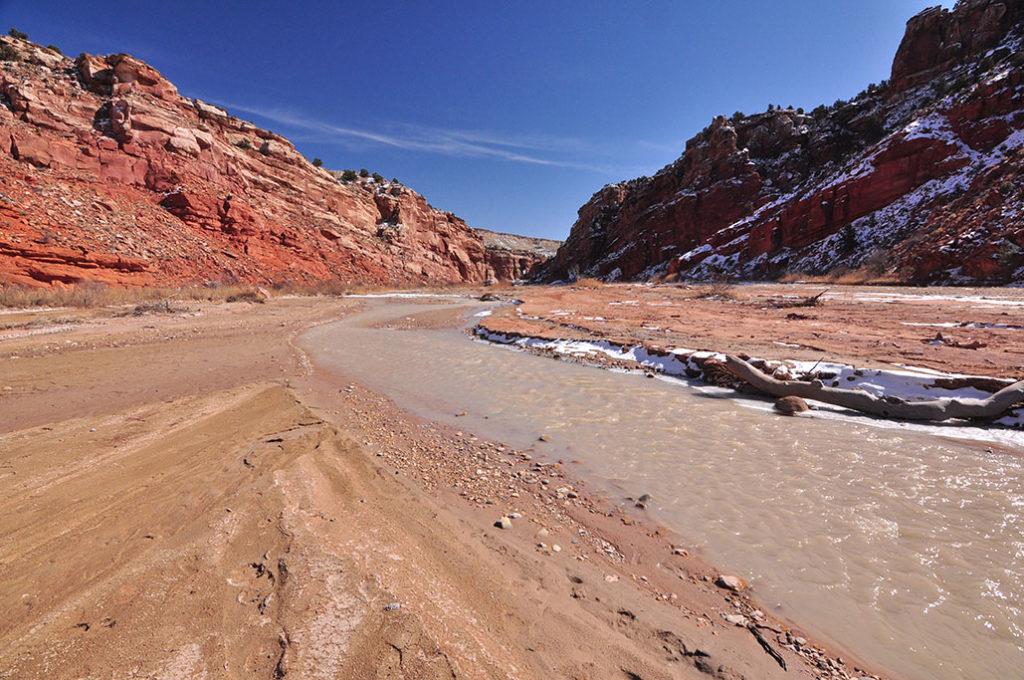
A State of Utah R.S. 2477 claim in the Paria River streambed (Grand Staircase-Escalante National Monument and Paria-Hackberry Wilderness Study Area)/ © Ray Bloxham/SUWA
The U.S. Supreme Court has agreed to allow two conservation groups to intervene in Utah cases involving state efforts to have dirt washes, seasonal streambeds, and possibly even cattle trails and hiking paths declared roads across federal lands.
Utah officials long have sought approval to improve dirt tracks that meander across federal lands in the state, claiming such access was guaranteed under a Civil War-era law.
R.S. 2477 was passed by Congress in 1866 to allow the construction of roads across federal lands that were not already reserved for public use. In 1976 Congress repealed the law, but not before providing that any valid R.S. 2477 route existing at the time of the repeal could continue in use. Since then, there have been many debates and many lawsuits over what constituted a valid R.S. 2477 route.
In years past some states, counties, and off-road groups have claimed that washes, two-tracks, even cow paths and hiking trails are "highways" that they are entitled to open to motorized travel, according to those who oppose the granting of these rights.
According to the Southern Utah Wilderness Alliance and The Wilderness Society, Utah officials have filed more than 20 lawsuits claiming more than 12,000 rights of way totaling more than 32,000 miles. While there were efforts to deny SUWA and TWS intervenor status in those lawsuits, the Supreme Court on Monday refused to block their participation.
“We’re pleased the Supreme Court denied these petitions and look forward to vigorously defending our members’ and the United States’ interests in the wildest, most remote corners of southern Utah,” said Stephen Bloch, SUWA's legal director. “The state’s litigation, claiming highways in stream bottoms and cow paths, has always been about who controls federal public lands in Utah, with the goal to riddle these landscapes with roads and make them ineligible for congressional Wilderness designation. This absolutely cuts to the core of our mission.”
At The Wilderness Society, Conservation Director Phil Hanceford said his organization is "focused on using science and common sense to protect our land, our air, and our water for the health of our communities and for future generations. ... There are appropriate places for roads, but cutting through Utah’s spectacular red rock wildlands and creek beds are not those places.”
In recent years there have been controversial court decisions that denied some of these rights. One example surfaced in 2007 when a federal judge tossed out a lawsuit seeking to justify off-road vehicle use in Surprise Canyon near the western edge of Death Valley National Park.
In 2009 a federal appellate court prevented Kane County, Utah, officials from placing signs in Glen Canyon National Recreation Area to designate ORV travel routes until the validity of R.S. 2477 routes could be adjudicated. More to the point, the judges held that the county's actions violated the supremacy clause of the U.S. Constitution. That clause provides that federal law supersedes local or state laws involving federal issues where the two conflict.
In May 2019 a lawsuit was brought against the U.S. Bureau of Land Management over a road improvement project near Capitol Reef National Park in central Utah. The filing claimed there was little if any public scrutiny for a Utah county to chip-seal more than seven miles of a remote high desert track near the park; environmental groups feared the project would adversely impact solitude, wildlife, and lead to resource damage on wild lands next to Capitol Reef.
The case is still pending.




 Support Essential Coverage of Essential Places
Support Essential Coverage of Essential Places







Comments
Good news!